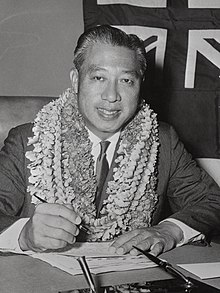Hiram Fong | |||||||||||
|---|---|---|---|---|---|---|---|---|---|---|---|
鄺友良 | |||||||||||
 Official portrait, c. 1964 | |||||||||||
| United States Senator from Hawaii | |||||||||||
| In office August 21, 1959 – January 3, 1977 | |||||||||||
| Preceded by | Seat established | ||||||||||
| Succeeded by | Spark Matsunaga | ||||||||||
| Speaker of the Hawaii House of Representatives | |||||||||||
| In office 1948–1954 | |||||||||||
| Preceded by | Manuel Paschoal | ||||||||||
| Succeeded by | Charles E. Kauhane | ||||||||||
| Member of the Hawaii House of Representatives from the 5th district | |||||||||||
| In office 1938–1954 | |||||||||||
| Personal details | |||||||||||
| Born | Yau Leong Fong October 15, 1906 Honolulu, Territory of Hawaii, U.S. | ||||||||||
| Died | August 18, 2004 (aged 97) Kahaluu, Hawaii, U.S. | ||||||||||
| Political party | Republican | ||||||||||
| Spouse |
Ellyn Lo (m. 1938) | ||||||||||
| Children | 4; including Hiram Fong Jr. | ||||||||||
| Education | University of Hawaii, Manoa (BA) Harvard University (LLB) | ||||||||||
| Occupation | Businessman, lawyer, politician | ||||||||||
| Military service | |||||||||||
| Allegiance | United States | ||||||||||
| Branch/service | |||||||||||
| Years of service | 1942–1945 | ||||||||||
| Rank | |||||||||||
| Unit | • Seventh Air Force | ||||||||||
| Battles/wars | World War II | ||||||||||
| Chinese name | |||||||||||
| Traditional Chinese | 鄺友良 | ||||||||||
| Simplified Chinese | 邝友良 | ||||||||||
| |||||||||||
Hiram Leong Fong (born Yau Leong Fong;[1] October 15, 1906 – August 18, 2004) was an American businessman, lawyer, and politician from Hawaii. Born to a Cantonese immigrant sugar plantation worker, Fong was one of the first two senators for Hawaii after it became the 50th US state in 1959. He was the first Chinese-American and first Asian-American United States Senator, serving from 1959 to 1977, and to date he remains to be the only Republican Senator from Hawaii.[2]
At the 1964 Republican National Convention, Fong became the first Asian-American to receive delegate votes for his party's nomination for President of the United States. In the Senate, Fong supported civil rights legislation and eliminating ethnic barriers to immigration.[3]
- ^ Nakaso, Dan (August 18, 2004). "Hiram Fong dead at 97". Honolulu Advertiser. Archived from the original on September 10, 2004. Retrieved July 20, 2019.
- ^ Bernstein, Adam (August 19, 2004). "Hiram Fong Dies; One of First Hawaiian Senators". The Washington Post. p. B6. Archived from the original on May 25, 2017. Retrieved July 20, 2019.
- ^ Bernstein, Adam (August 19, 2004). "Hiram Fong Dies". The Washington Post.